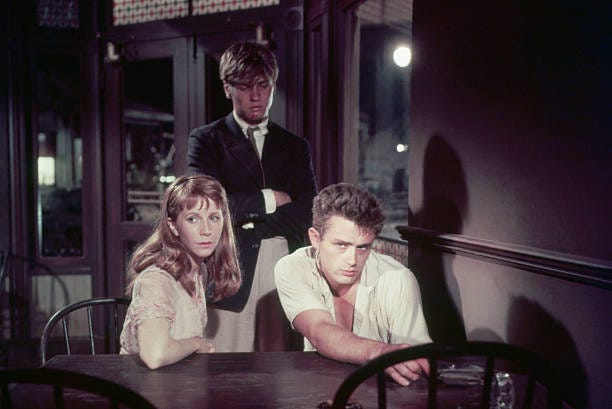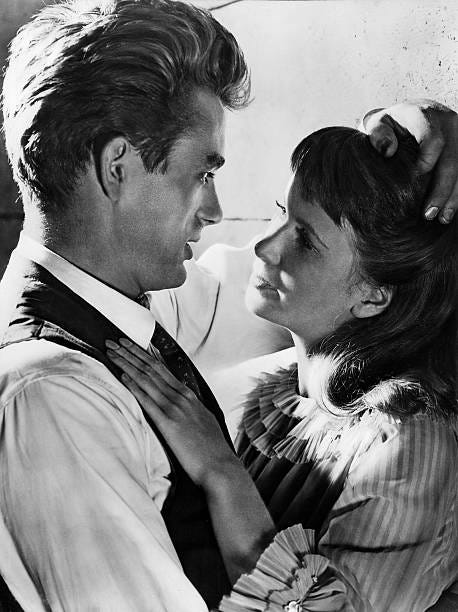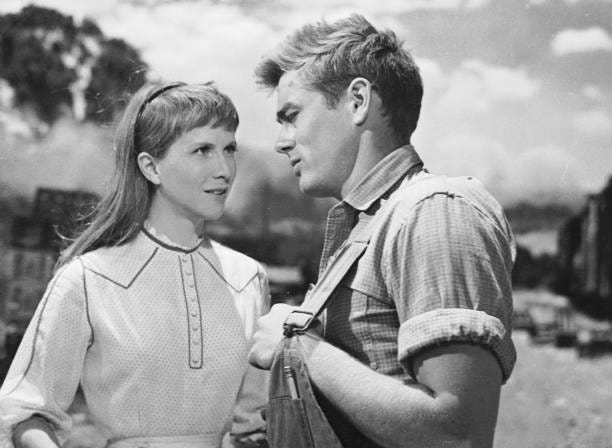Julie Harris: Altered
Julie Harris on how her work with James Dean in Elia Kazan's EAST OF EDEN altered her.
James Grissom: “Lois Smith told me that there was a very real, very palpable sense of James Dean being husbanded, tended to during the making of the film [East of Eden]…
Julie Harris: …”All of us felt husbanded, cared for. That was the great strength of [Elia] Kazan’s direction. Well, not just his direction, but his care, his devotion to the script and to every single element that made up that film. I mean, Kazan was so concerned with the lettuce, the blocks of ice, the sets, the costumes. Kazan wanted me to look a very particular way: Very pure, virginal. A ‘good’ girl. Kazan wanted me to glow. He never said this to me. I would have been confused by that, because how do you glow? The worst thing I think I could have done would have been to glow, to manifest this glowing quality he wanted. So I did what I think actors should do: I took his notes, and I just burrowed in to the script, and I just looked at Jimmy [Dean] as this extraordinary thing that had managed to land on the familiar land on which we lived and moved. You know, thinking of it now, I looked, initially, at Jimmy as if he were an Elgin marble that had dropped in Salinas [California]. I like to go to museums and look at the works of art—paintings and sculptures—and wonder about their place in time. Who stood before these great pillars and statues? People lived among these things, but people must have been amazed to see them. I think a real spiritual belief arises around and in front of art, because you are seeing something extraordinary that has come about because another person—a human being a lot like you—has been given this gift to craft something that just amazes you, stuns you. So I thought of Jimmy that way. Both Jimmy and his character [Cal]. I didn’t know Jimmy well. I never really got to know Jimmy well, but I got to know him better, and it became easier to look at him as if he were a wonderful sculpture or a figure of light because he was just so extraordinary. He was so beautiful. That beautiful face. The way he approached his work. The way he responded to Kazan. He was so complicated. I became very protective of him. I think my character was falling in love with him, which shocked me as her, because she was a ‘good’ girl, and she was promised to his brother, but I felt she was falling in love with him. She was having sexual feelings for him, which would then become very complicated, blocked, dulled by her protective feelings. So I was both a young woman falling in love and a maternal figure, and my feelings frightened me. He frightened me, and I began to behave in that way, and Kazan complimented me on what I was doing. I was not aware of what I was doing, but I see now that I was always looking around as if afraid that people would know how I felt, or what I was looking at. It has embarrassed me when I’ve been looking at someone beautiful, and I’ll look around to see if I’ve been noticed. Well, I was looking around a lot to see if I was being noticed, and I was looking around a lot to see if he was around, to look at me and for me to have a chance to see him again.”
James Grissom: “You had it bad, as they say.”
Julie Harris: “Oh, I did. I’m always asked if I was attracted to Jimmy. Yes, I was. I’m asked if I was tempted. I wasn’t. I was in love with him as a man, as an actor, as an acting partner. But, I would always add, I did not want him. That final statement is usually left out, so people always congratulate me on the affair I’m supposed to have had with James Dean.’
James Grissom: “Lois is always denying the same.”
Julie Harris: “I know! We laugh about it. Lois and I show up for screenings of the film. I love doing that. I love seeing that film. There is so much detail in that film. I’m always surprised. I can see why people would think that Lois and Jimmy fell in love. There is so much of a connection between them, but it’s two remarkable actors doing their best work with one of the best directors. It’s not hormonal. It’s not foreplay.”
James Grissom: “I talk to Lois a lot about what makes a good director. What is good direction? I read reviews—current and from the past—and I’ll read ‘This film is agonizingly well-directed’ or ‘directed with great precision,’ and I want to know what they saw, or think they saw. What is anything that is ‘agonizingly’ done?
Julie Harris: “Well, you showed me those quotes, and I don’t really know what that means. It clearly means something to the critic who wrote it. I think something done ‘agonizingly’ would be poor. It makes me think that beneath every scene, every performance, you can imagine sweat and lifting and effort. That is, to me, poor direction, bad acting. I think they might mean ‘acute’ or ‘detailed,’ and they might be imagining a director agonizing over each and every detail. Getting it right. Pushing it higher. I see plays and I think the direction is marvelous because it just opens and flowers before us, without a stumble. Each part perfectly cast and presented. A good director places a jewel—the play perfectly cast—in the setting—the theatre—and allows it to gleam.”
James Grissom: “So casting is most of it?”
Julie Harris: “I hate to say most of it. It’s not mathematical. It’s not a recipe. You know, ten percent of this; thirty percent of that. But casting is crucial. One part not well cast can throw things off, but I’ve been in plays and films—and have seen others—that had parts cast with actors who were not, as they said, ‘right,’ but the actor and the director worked so well together that it all came together, and now you can’t imagine anyone else in the role. Not long ago, an actress—a good actress, I think—was just so critical of the casting of a role. I don’t do this sort of thing. I don’t think the world or a table of diners needs to know what I think of something, anything. I try to be vague, unless I’m really delighted with something, in which case I go on and on. This actress, who considers herself plain, although I love how she looks, was going on and on about how angry she was that Geena Davis had been cast in The Accidental Tourist. This actress, who admitted that she had been submitted for the part, told us how the character, Muriel, a dog walker, was ugly, awkward. Those were the terms she used. And she was enraged that Geena Davis, this ‘great beauty’ as she put it, ‘ruined’ the part. Well, I disagreed. I didn’t argue. I made a gentle escape…”
James Grissom: "…the Marian Seldes maneuver!”
Julie Harris: “Exactly! I think she has helped me to refine it. Well, I don’t think Geena Davis ‘ruined’ anything. But would I know? I don’t have two interpretations side by side to compare. I know that Geena Davis worked for me. That film worked for me. I appreciated what was done in that film. I think Geena Davis is beautiful, but I believed that as Muriel she didn’t believe she was beautiful. I believed her as an awkward, insecure woman crawling out on emotional limbs to find what she needed and wanted. I also didn’t think this critical actress was ugly, but you never can disabuse anyone of a calcified belief. I know about this, I assure you.
“Certain parts with certain directors can alter you in so many ways. How you feel, how you look. In East of Eden, Kazan would say to me, in that ice house scene, ‘Get closer to him. Really close.’ I was in that ice house with my boyfriend, and maybe we might kiss. We would hold hands. We would make promises to each other. I decided that my character was so insecure about her sexual attraction and abilities that she was aching to have sex just to see if she could handle it or do it. To find out where she was lacking. To find out what she could learn. So I was thinking in erotic terms. And when Kazan told me to get even closer, I wanted to say, ‘No! I can’t do that. Because Jimmy—as Cal, the brother—is going to see us.’ Of course he’s going to see us. That was planned, expected. But I realized that I was being caught in an unfaithful act. I was desiring both of the brothers. I was caught. It’s back to being caught looking. Caught feeling.
“I want to say this. I spoke to Jimmy about his betrayals in the film. In that ice house scene, what does Cal’s brother do when he realizes his brother is spying on them? He laughs. He thinks, ‘What a cad.’ I’m horrified. I’m angry. I’ve been caught. I even criticize him and his behavior. It’s my behavior, my interior behavior, that horrifies me. I told Jimmy that his brother—like him attractive and liked and promising—simply didn’t have the sensitivity or intelligence he had. He doesn’t feel things. He is unaware of the size and importance of things—in love, in the city, in the world. Cal is aware—or thinks he is—that the world is about to change. There is war. There is the mother across town who is a madam in the best house on the Coast. Their father, so righteous, has lied to them, held them to a standard that one brother fights and the other just slips on as if it were a nice hand-me down coat. This infuriates Cal, so he has to reveal the truth to his brother. So tragedy happens. The brother meets his mother. He runs to war, and given that our film does not extend into [John] Steinbeck any farther than that, he might die or be maimed. My character doesn’t know. She is devastated. Then Cal’s father suffers a stroke and may die. And the father askes for Cal to care for him, and I knew, I decided, that I would be there as well. We would be together. It might not be romantic. It might not be what I had wanted. But we would be together. And I was no longer looking around to see if I had been caught. I would have been proud to have been seen doing and feeling what I was. I wanted, at last, to be seen.”
Interview with Julie Harris
Conducted by James Grissom
Hotel Wyndham
1991
(All images via Getty/John Kobal Foundation)






